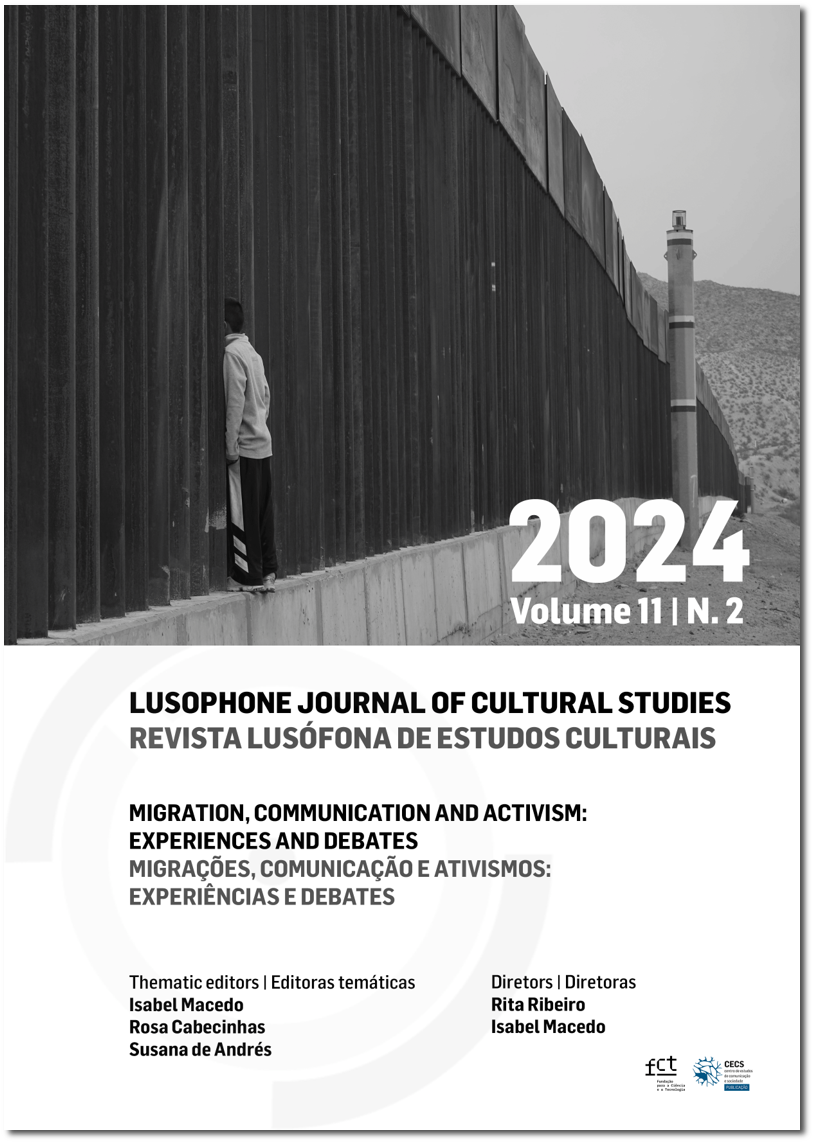The Protagonism of Venezuelan Migrant Women in the Documentary Short Film Hermanos, Aqui Estamos (2021) by Jade Rainho
DOI:
https://doi.org/10.21814/rlec.5753Keywords:
Venezuelan migrants, representation, short film, communicationAbstract
The text analyses the elements that make up the reality of Venezuelan migrants, who narrate their stories in the short documentary Hermanos, Aqui Estamos (Brothers, Here We Are; 2021). Using thematic analysis as a methodology (Braun & Clarke, 2006), with an inductive and contextualized approach, we identified five narrative groups for the 12 subjects of the documentary short film. We identified three themes and seven sub-themes from the research corpus: introducing the subjects (who are they? how did they get here?); migrating (why are they here? difficult choices; work) and feelings (about the country of origin; about being a migrant). We analysed the documentary short film by discussing the relationship between communication and the migrant condition, based on ElHajji (2018), and subalternity and representation, according to Spivak (1988/2010). Thus, it was concluded that this documentary production is of great importance because it opens up a space for migrant women to tell their own stories and reach other people, including other Venezuelan migrants. In this way, the short documentary Hermanos, Aqui Estamos (2021) preserves the memory of these women, working both as a communication tool and as an exposé of the problems that society and the Brazilian state must address in order to properly welcome and include them.
Downloads
References
Almeida, C. D., Felippe, A. M., & Ramos, E. M. (2022). Communication, borders and migration process: Venezuelans in Cuiaba/Brazil. Trayectorias Humanas Transcontinentales, (8), 134–150. https://doi.org/10.25965/trahs.4753
Baeninger, R., Demétrio, N. B., & Domeniconi, J. O. S. (Eds.). (2020). Atlas temático: Observatório das Migrações em São Paulo. Migrações venezuelanas. Núcleo de Estudos de População “Elza Berquó” – Nepo/Unicamp. https://www.nepo.unicamp.br/publicacao/migracoes-venezuelanas/
Braun, V., & Clarke, V. (2006). Using thematic analysis in psychology. Qualitative Research in Psychology, 3(2), 77–101. https://doi.org/10.1191/1478088706qp063oa
Cadju Filmes. (s.d.). Hermanos, Aqui Estamos. Retirado a 20 de abril de 2023, de https://www.cadjufilmes.com/filmesdocument%C3%A1rios. Acesso em: 20 abr. 2023
Constituição da República Federativa do Brasil de 1988. (1988). https://www.planalto.gov.br/ccivil_03/constituicao/constituicao.htm
Costa, M. M. M., & Schwinn, S. A. (2018). A discriminação múltipla sobre as mulheres migrantes. In M. R. G. Mejía (Ed.), Migrações e direitos humanos: Problemática socioambiental (pp. 197–207). Editora Univates.
Demartini, Z. de B. F. (2018). Narrativas de imigrantes do passado e do presente: Questões para pesquisa. Revista Brasileira De Pesquisa (Auto)biográfica, 3(7), 45–66. https://doi.org/10.31892/rbpab2525-426X.2018.v3.n7.p45-66
ElHajji, M. (2018). Migrantes, uma minoria transnacional em busca de cidadania universal. In M. R. G. Mejía (Ed.), Migrações e direitos humanos: Problemática socioambiental (pp. 89–102). Editora Univates. https://www.univates.br/editora-univates/media/publicacoes/266/pdf_266.pdf
Faustino, D., & De Oliveira, L. M. (2022). Xeno-racismo ou xenofobia racializada?: Problematizando a hospitalidade seletiva aos estrangeiros no Brasil. REMHU, Revista Interdisciplinar Da Mobilidade Humana, 29(63), 193–210. https://doi.org/10.1590/1980-85852503880006312
Fisher, M. (2020). Realismo capitalista: É mais fácil imaginar o fim do mundo do que o fim do capitalismo? Autonomia Literária.
Gil, A. C. (2002). Como elaborar projetos de pesquisa. Atlas.
Gil, A. C. (2008). Métodos e técnicas de pesquisa social (6ª ed.). Atlas.
James, O. (2008). The selfish capitalist: Origins of affluenza. Vermillion.
Junger, G., Cavalcanti, L., Oliveira, T. de, & Lemos, S. F. (Eds.). (2023). Refúgio em números 2023. OBMigra. https://portaldeimigracao.mj.gov.br/images/Obmigra_2020/OBMIGRA_2023/Ref%C3%BAgio_em_N%C3%BAmeros/Refugio_em_Numeros_-_final.pdf
Lei n.º 14.017, de 29 de junho de 2020. (2020). https://www.planalto.gov.br/ccivil_03/_ato2019-2022/2020/lei/l14017.htm
Mezzadra, S. (2013). Multidão e migrações: A autonomia dos migrantes. Revista Eco-Pós, 15(2), 70–107. https://doi.org/10.29146/eco-pos.v15i2.900
Morales, O. M. (2007). La migración de las mujeres ¿Un proyecto individual o familiar? REMHU - Revista Interdisciplinar da Mobilidade Humana, 15(29), 23–45.
Peoples Dispatch. (2023, 29 de setembro). Mais de 2,5 mil imigrantes morreram ou desapareceram ao tentar chegar à Europa via Mar Mediterrâneo este ano, informa a ACNUR. Brasil de Fato. https://www.brasildefato.com.br/2023/09/29/mais-de-2-5-mil-imigrantes-morreram-ou-desapareceram-ao-tentar-chegar-a-europa-via-mar-mediterraneo-este-ano-informa-a-acnur
Rainho, J. (Diretora). (2021). Hermanos, aqui estamos. Cadju Filmes.
Rosa, L. S. da, & Mackedanz, L. F. (2021). A análise temática como metodologia na pesquisa qualitativa em educação em ciências. Revista Atos de Pesquisa em Educação, 16, e8574. https://doi.org/10.7867/1809-0354202116e8574
Santos, E. N. B. R. dos, Felippe, A. M., & Almeida, C. D. de. (2023). Sementes de transformação. Entrevista a Jade Rainho. In A. W. N. de Siqueira, D. B. de Lima, G. M. da Costa & L. X. de L. Capanema (Eds.), Cinema e audiovisual em Mato Grosso (pp. 242–254). Paruna Editorial.
Sivanandan, A. (2001). Poverty is the new black. Race & Class, 43(2), 1–5. https://doi.org/10.1177/0306396801432001
Spivak, G. C. (2010). Pode o subalterno falar? Editora UFMG. (Trabalho original publicado em 1988)
Downloads
Published
How to Cite
Issue
Section
License
Copyright (c) 2024 Emile Botelho, Alessandro Mateus Felippe, Cristóvão Teixeira Rodrigues

This work is licensed under a Creative Commons Attribution 4.0 International License.
Authors own the copyright, providing the journal with the right of first publication. The work is licensed under a Creative Commons - Atribuição 4.0 Internacional License.








